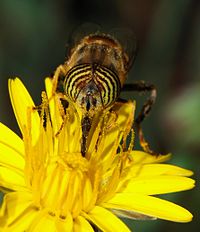
Photo from wikipedia
Abstract The main selective force driving floral evolution and diversity is plant–pollinator interactions. Pollinators use floral signals and indirect cues to assess flower reward, and the ensuing flower choice has… Click to show full abstract
Abstract The main selective force driving floral evolution and diversity is plant–pollinator interactions. Pollinators use floral signals and indirect cues to assess flower reward, and the ensuing flower choice has major implications for plant fitness. While many pollinator behaviors have been described, the impact of parasites on pollinator foraging decisions and plant–pollinator interactions have been largely overlooked. Growing evidence of the transmission of parasites through the shared‐use of flowers by pollinators demonstrate the importance of behavioral immunity (altered behaviors that enhance parasite resistance) to pollinator health. During foraging bouts, pollinators can protect themselves against parasites through self‐medication, disease avoidance, and grooming. Recent studies have documented immune behaviors in foraging pollinators, as well as the impacts of such behaviors on flower visitation. Because pollinator parasites can affect flower choice and pollen dispersal, they may ultimately impact flower fitness. Here, we discuss how pollinator immune behaviors and floral traits may affect the presence and transmission of pollinator parasites, as well as how pollinator parasites, through these immune behaviors, can impact plant–pollinator interactions. We further discuss how pollinator immune behaviors can impact plant fitness, and how floral traits may adapt to optimize plant fitness in response to pollinator parasites. We propose future research directions to assess the role of pollinator parasites in plant–pollinator interactions and evolution, and we propose better integration of the role of pollinator parasites into research related to pollinator optimal foraging theory, floral diversity and agricultural practices.
Journal Title: Ecology and Evolution
Year Published: 2019
Link to full text (if available)
Share on Social Media: Sign Up to like & get
recommendations!